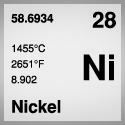
NICKEL IS COMPLETELY RESISTANT TO PHOSPHORIC ACID, AS WELL AS BEING HIGHLY RESISTANT TO THE CORROSIVE EFFECTS OF THE STRONGEST ALKALIS.
Nickel belongs to the iron-cobalt group of metals. It forms an adherent oxide film that provides its corrosion resistance up to temperatures around 600°C. It's highly resistant to alkalis and most acids, however, it is attacked by oxidizing acids like nitric and by salt solutions containing oxidizing species. Nickel finds applications in the electronic and aerospace industries and in chemical and food equipment construction. Heat shields, evaporators, laboratory equipment, and glass to metal — ceramic to metal seals are additional applications that use pure nickel.
PROPERTIES
Nickel is a lustrous, hard, white metal that can take a high polish. It is malleable, ductile and slightly ferromagnetic.
- Atomic No. 28
- Atomic Wt. 58.6934
- Specific Gravity 8.90
- Melting Point 1455°C
- Coefficient of Linear Expansion 13.4 X 10-6/°K
- Specific Heat 0.106 cal/°K
- Ultimate Tensile Strength (Room Temperature, Annealed) 67 ksi
- Yield Tensile Strength (Room Temperature, Annealed) 22 ksi
- Poisons Ratio 0.31
- Modulus of Elasticity 29 X 106 psi
GENERAL CORROSION RESISTANCE
Nickel exhibits good corrosion resistance in acids and alkalis, however, it is not a material to use in oxidizing salt solutions.
This data is based on laboratory testing only. Your in-plant results may differ. Testing is recommended under other conditions as needed.
